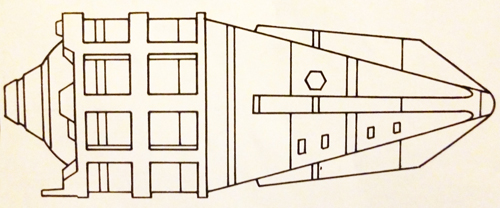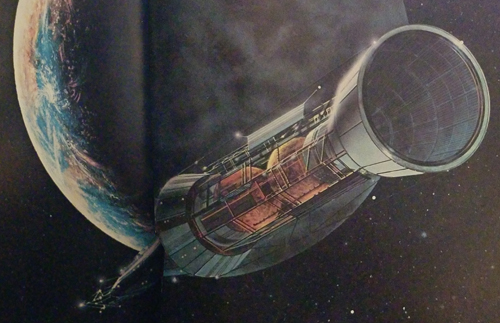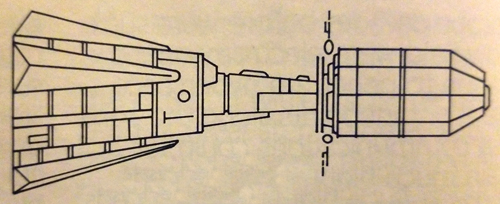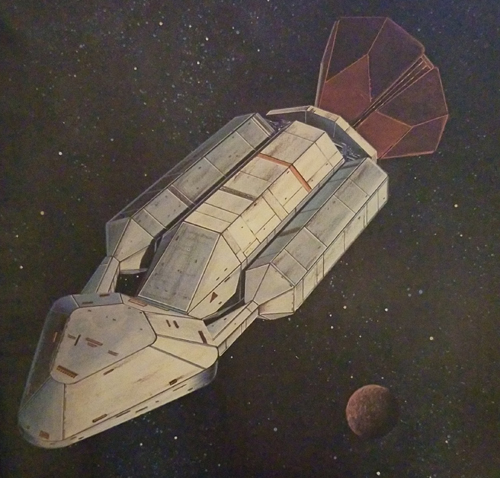2050s (FASA)
From Trekipedia
Revision as of 21:27, 13 March 2021 by Admin (talk | contribs) (Admin moved page FASA Chronology: 2050s to 2050s (FASA))
Reference Stardate 0/5001 through 0/5912
2050
- RSD 0/50: In a little over half a century, Humans can be found throughout the Solar system, an accomplishment previous generations of Earthside pioneers would have been proud of.[1]
- RSD 0/50: The first Romulan settlement efforts in the Triangle area begin. Most of these early settlements are later abandoned or annihilated during the years of Romulan/Klingon conflict. Remains of many of these lost colonies may be found on various worlds in the region.[2]
- RSD 0/5011 (November): The Fourteen Clans of Cait are united under one government for the first time in their history, setting the stage for Caitian civilization as it is now known.[3]
2051
2052
- RSD 0/52: The Galileo class vessels are retired from service.[1]
- RSD 0/52: The Glenn class space bus enters service, with a crew of 28 and a passenger capacity of up to 450. With more than 200 built, they will serve as the principal surface-to-orbit carriers during the second half of the 21st century.[1]
- RSD 0/52: After four years, transmission of the Warp Drive Principle is received on Earth (FASA). It causes a sensation and an intensive Warp Drive Studies Program is immediately set up.[1][3]
2053
- RSD 0/5303 (March): Centauran biosociologist Zancmar Hodgkins publishes his Law of Parallel Planet Development, stating that similar planets develop similar life-forms with similar cultures. After careful study and approval by the Alpha Centauri Academy of Biosciences, it is transmitted to Earth, where it is received 52 months later.[4]
2054
- RSD 0/5409 (September): The U.N.S.S. Icarus returns from its historic journey. A United Nations mission is dispatched to Alpha Centauri to begin official recognition, discuss trade, and exchange knowledge of each other's history.[1][3]
- RSD 0/54: The Wayne class scout, with a complement of 8, enters service.[1]
2055
- RSD 0/5507 - 0/5909 (July 2255 - September 2259): The first experimental warp drive ships are tested by Earth and Alpha Centauri research teams.[1][5]
- RSD 0/5507: The warp drive program results in the first vessel to exceed the speed of light, the WD-1. Rosy, a chimpanzee sent along for the ride, is safe and sound.[1]
2056
- RSD 0/56: Interplanetary high-speed ambulances, such as the Keller class, improve the survival rates of severely sick and injured people in the Solar system with quicker access to Earth-based medical facilities.[1]
2057
- RSD 0/57: A poll for the celebration of humanity's centennial in space lists encountering life on Alpha Centauri, the first men on the moon, and the Venus Terraforming Project as the three most significant events of the past century.[1]
- RSD 0/5706 (June): The Xenobiological Probability Study, underwritten by the University of Luna for the United Nations of Earth, is released. This study concludes mathematically that the chances of discovering any non-humanoid intelligent life within the next century of exploration is extremely small.[1][4]
2058
- RSD 0/58: Earth's first warp capable ship, the Cochrane class U.N.S.S. Bonaventure, undergoes testing. It proves to be the remarkable craft its designers had hoped it would be.[1]
- RSD 0/58: The Liberty class enters service. One of the first ships commissioned is the U.N.S.S. Bonhomme Richard. The class will remain in service until 2093.[1]
- RSD 0/5807 (July): After a long period of unexplained idleness, Klingon conquest and exploratory efforts begin anew.[6]
2059
- RSD 0/59: The U.N.S.S. Bonaventure begins Earth's warp drive era with a voyage to the Tau Ceti system, 12 light years from the Solar system, under the command of Captain Hadrian Huckleby.[1][3]
- RSD 0/59: The United Nations mission that left Earth in 2054 arrives at Alpha Centauri, and official recognition begins.[1][3]
- RSD 0/59: The Advanced Pluto Research Station opens.[1]
- RSD 0/59 through 0/72 (2059-2072): Terran space forces have several violent encounters with aliens later identified as the Vegan Tyranny.[3]
Notes and References
- ↑ 1.00 1.01 1.02 1.03 1.04 1.05 1.06 1.07 1.08 1.09 1.10 1.11 1.12 1.13 1.14 1.15 1.16 Goldstein, Stan et al (Authors). Spaceflight Chronology. Star Trek. Book. Wallaby Books. 1980.
- ↑ McLimore, Guy W. Jr. et al (Authors). The Triangle. Star Trek: The Role Playing Game. Book 2007. Cover art by David Martin. Graphic design by Jordan Weisman. Graphics, layout, and illustrations by Dana Knutson, Todd F. Marsh, Jane Bigos, and David J. Hutchins. FASA Corporation. 1985.
- ↑ 3.0 3.1 3.2 3.3 3.4 3.5 Menke, Bernard Edward and Rick David Stuart (Authors). The Federation. Star Trek: The Role Playing Game. Book 2011. Cover art by David R. Deitrick. Illustrations by Todd F. Marsh, John C. Tylk, Bob Eggleton, Daniel E. Carroll, and Jay Harris. FASA Corporation. 1986.
- ↑ 4.0 4.1 Theisen, John A. (Author). The Romulan War. Star Trek: The Role Playing Game. Book 2221A . Cover art by Dana Knutson. Illustrations by Cliff Van Meter and Dana Knutson. FASA Corporation. 1986.
- ↑ Wheeler, Wm. John et al (Authors). Cadet's Orientation Sourcebook. Star Trek: The Role Playing Game. Book 2004A, Second Edition. Cover art by Rowena. Graphics and layout by Dana Knutson and Jordan Weisman. FASA Corporation. 1983.
- ↑ McLimore, Guy W. Jr. et al (Authors). The Klingons: Star Fleet Intelligence Manual. Star Trek: The Role Playing Game. Book 2002, Second Edition. Based on original material by John M. Ford. Illustrations by Todd F. Marsh, Dana Knutson, Jeff Laubenstein, and Mitch O'Connell. FASA Corporation. 1987.




